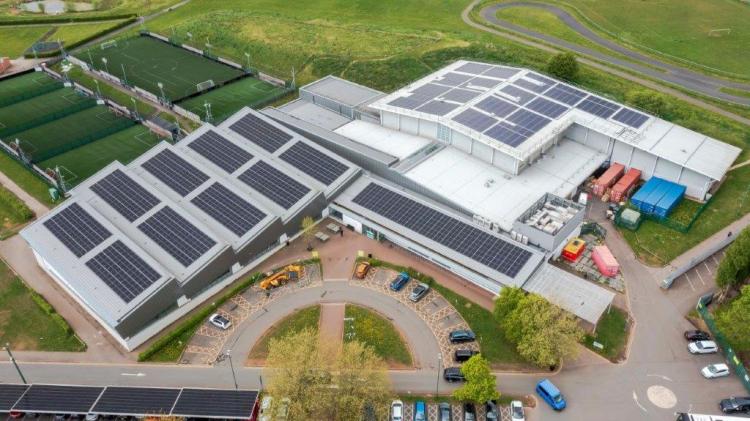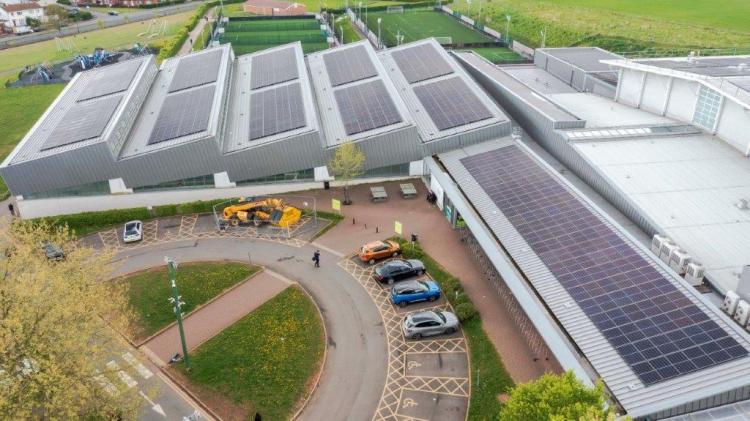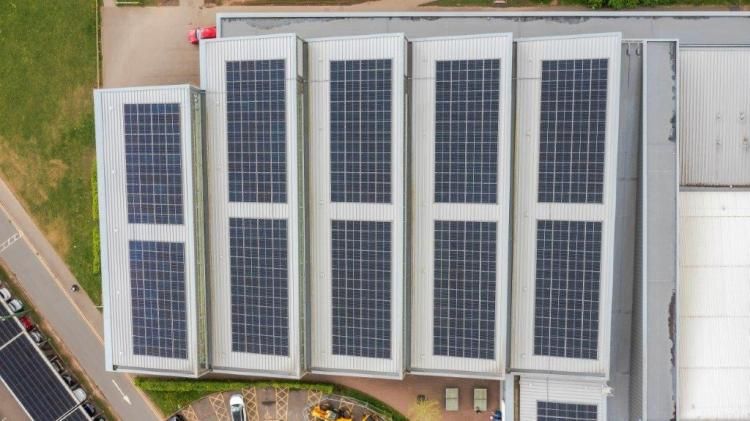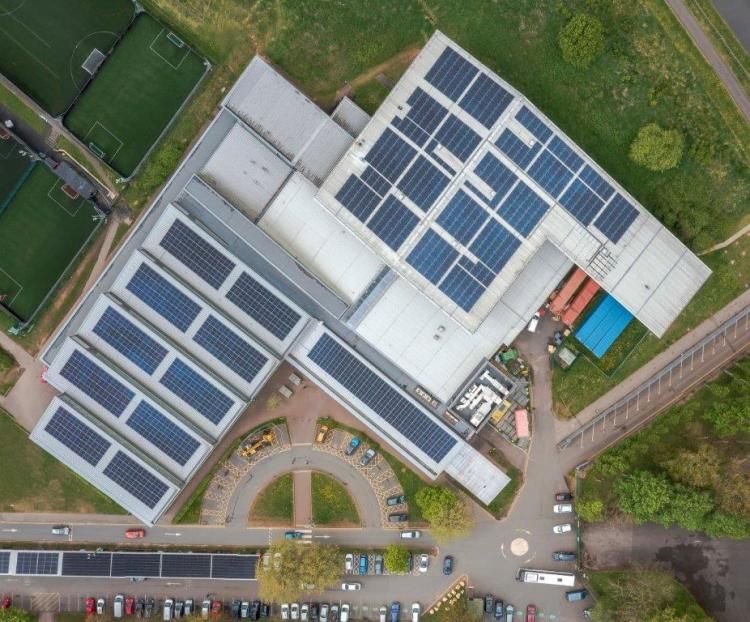City’s energy is more sustainable thanks to major project at a Nottingham sports village
Collaboration has been key to the success of a groundbreaking renewable energy project for Nottingham City Council, boosting ambitions to achieve carbon neutrality.
Harvey Hadden Sports Village, is thought to be one of the UK’s largest solar-powered leisure centres, with a total installed solar photovoltaic (PV) capacity of 571.5 kWp, following the completion of its third phase of solar installation.
The project, aimed at reducing carbon emissions and increasing sustainable energy, was boosted by more than £449,000 from the council’s Salix Recycling Fund.
The council tapped into the Salix Recycling Fund, now closed, which enabled organisations to reinvest savings from past energy projects into new carbon saving initiatives.

Aerial shots of Harvey Hadden Sports Village in Nottingham
Photo credit: Lindum Group
The sustainable Harvey Hadden Sports Village project started in 2015 with the installation of a 67.2 kWp solar car port. The car port included 40 parking bays and generated approximately 50,772 kWh of clean energy annually. This marked the first major step toward transforming the centre into a solar-powered hub.
Our Salix programme manager Archie Balkwill said: “This has been an inspiring project and has made a big difference to the way the council consumes energy.
“It has helped steer the way to a more sustainable future and helped inspire the council in its net zero journey.”
In 2018, a 200 kWp roof-mounted system was added, significantly increasing the centre’s renewable energy capacity and reducing its dependence on grid electricity.
We’re sharing the drone footage, courtesy of Lindum Group, which provides impressive aerial views giving an idea of the expanse of the project.
This year a 307.58 kWp rooftop solar system was added. This system comprises 676 bifacial panels (1,365 square metres) and is expected to generate around 257,752 kWh of clean energy annually, saving around 60 tonnes of CO2 each year.
Over its 30-year lifespan, this phase is estimated to save more than £3.66 million in electricity costs along with approximately £315,907 in gas savings.
This has been an inspiring project and has made a big difference to the way the council consumes energy. It has helped steer the way to a more sustainable future and helped inspire the council in its net zero journey.”

Photo credit: Lindum Group
Harvey Hadden Sports Village now generates more than 500,000 kWh of solar energy each year - enough to power more than 120 average homes.
The latest upgrade will meet 46% of the centre’s electricity needs with solar power and is expected to offset more than 105 tonnes of CO2e annually. One of the standout features of this phase is the integration of an electric pool heater, powered by surplus solar energy.
Of the total energy produced, 74% is consumed on-site, directly powering the building’s daily operations. Surplus solar power is used to heat the swimming pool, significantly reducing dependence on gas and improving overall energy efficiency.
This system eliminates the need for expensive battery storage, which the council says offers a cost-effective and environmentally friendly solution.
By efficiently harnessing solar energy, the centre ensures its operations remain sustainable. It’s important to project partners that all visitors, including families and children, directly benefit from this clean energy transformation.
The council also says that with the help of £203,724 in funding from the Salix/Nottingham City Council Recycling Fund, a total of 165 showers across six council leisure centres have been replaced with new energy efficient air powered showers.
These use patented air injection technology to allow for significantly reduced water usage without the loss of water pressure for the user.
The decrease in water usage in turn, brings significant reductions in the amount of gas required to heat the water. This means that across all six leisure centres, they will produce carbon savings of 196 tonnes per year, while also saving the council more than £82,000 per annum in gas costs.
The council says that over their lifetime the new showers will prevent over 2,477 tonnes of carbon and save the council more than £1m in gas costs.
In addition to the gas savings, the council also benefits from water savings of approximately 27,133 cubic meters which at current rates will save the council a further £94,965.50 this year alone.
The success of this installation is the result of a collaborative effort involving the city council’s environment and sustainability division, Salix, Scape Framework, Lindum Group and UK Alternative Energy.

Photo credit: Lindum Group
Nottingham has set an ambition to become carbon neutral by 2028, and this solar expansion provides significant progress to Nottingham’s Carbon Neutral Action Plan.
The project helps address the council’s commitment to increase generation from renewable sources across its properties. Since 2009, the council has implemented more than 300 energy-saving projects, reducing emissions and saving nearly £4 million in energy costs.
Council’s executive member for carbon reduction, leisure and culture Cllr Sam Lux, said: “Harvey Hadden Sports Village is one of the most energy-intensive buildings that we own, so it has been at the forefront of our efforts to decarbonise.
“I’m proud that we have taken a significant step forward, installing a new 307.58-kilowatt rooftop solar PV system, including an additional 676 state-of-the-art bifacial panels generating clean electricity each year starting this month.
“These savings aren’t just environmental - they support our ambition for financial sustainability and make the centre more resilient for the future. It’s a great example of what Nottingham is doing to lead the way in decarbonising public buildings and investing in a greener city.”

Photo credit: Lindum Group
Head of service for environment and sustainability, Jorge Santana, said:
“With one of the largest solar installations on a UK leisure centre, Harvey Hadden Sports Village is leading the way for carbon-neutral public infrastructure.
“By integrating solar power with the centre’s operations, including a system that uses surplus energy to heat the swimming pool, we’re cutting emissions, lowering energy costs, and reducing reliance on fossil fuels. This project was funded in part by the Salix Recycling Fund, enabling us to reinvest previous savings into impactful, future-facing carbon reduction solutions.”




